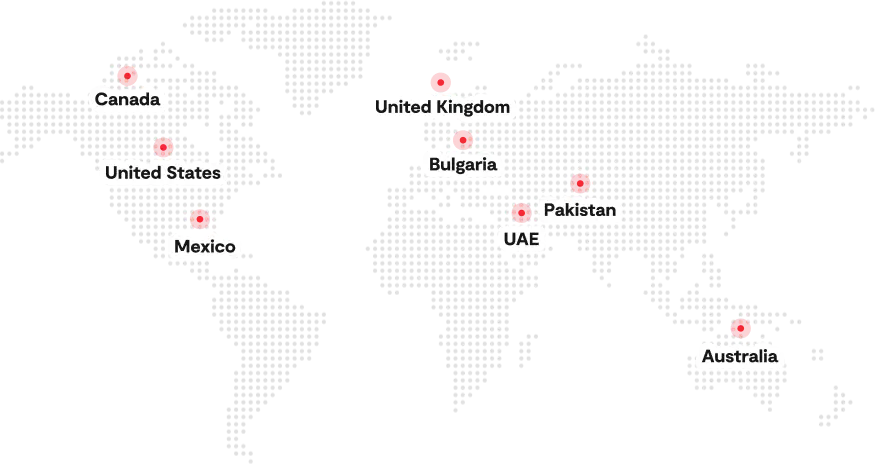The global meat industry is expected to reach a staggering value of over $1.3 trillion by 2027. As this market expands, the complexities and challenges facing meat processors have grown as well. One of the most effective tools for addressing these issues is meat processing ERP software.
Enterprise Resource Planning (ERP) systems are designed to optimize business processes, ensuring streamlined operations, improved traceability, and enhanced decision-making. In this blog, we will explore how meat processing ERP software can revolutionize your meat processing business by addressing common industry challenges, improving efficiency, and ensuring compliance with regulatory standards.
Understanding the Meat Processing Industry
The global meat processing industry is a vital sector, driving significant economic growth while ensuring a stable supply of protein to consumers worldwide. According to recent data, the meat industry was valued at over $44.3 billion in 2023 and continues to expand to 68.9 billion by 2028, at a CAGR of 9.2% from 2023 to 2028 due to rising demand for high-quality meat products and advancements in food processing technologies.
However, this growth comes with its own set of challenges, such as stringent regulatory requirements, increasing consumer expectations around sustainability, and the constant need for innovation in processing techniques. In this context, the role of technology, particularly ERP software, is becoming more critical.
Industry Overview
The meat processing industry is a vital part of the global food sector, driven by consumer demand for various protein sources. It has seen steady growth, with the processed meat sector accounting for a significant portion of the overall market. Despite the growth, companies are facing increased pressure to deliver high-quality products, maintain food safety, and comply with stringent regulatory requirements.
Challenges Faced
Meat processors face several hurdles, including:
- Regulatory Compliance: Ensuring adherence to food safety standards like the USDA or FDA regulations.
- Supply Chain Management: Managing raw material sourcing, logistics, and distribution across various regions.
- Quality Control: Maintaining consistent quality across batches while minimizing wastage.
Importance of Technology
Given these challenges, technology has become indispensable for meat processing businesses. Meat processing software solutions allow companies to automate critical functions, track production in real time, and ensure adherence to safety standards, transforming traditional meat processing operations into data-driven systems.
What is a Meat ERP Solution?
A Meat ERP solution is a specialized software designed specifically for the meat processing industry. Unlike generic ERP systems, it offers tools tailored to the unique needs of this sector.
Components of Meat ERP Software
- Procurement Management: Automates purchasing, tracks supplier performance, and manages supplier contracts.
- Inventory Management: Provides real-time visibility into inventory, monitors stock levels, and manages raw material flows.
- Production Planning: Ensures efficient scheduling, planning, and resource allocation.
- Quality Control: Implements checks throughout the production process to ensure product quality.
- Financial Management: Integrates financial reporting with operations, improving cost tracking and profit analysis.
How Data Analytics Modernization Benefits Your Business?
Modernizing data analytics brings transformative benefits to businesses, allowing them to operate with greater efficiency and agility in today’s digital age. With the help of updating legacy systems and leveraging cloud-based solutions, companies can scale their operations more effectively, reduce costs, and optimize decision-making processes.
Data analytics modernization also empowers businesses to tap into real-time insights, enhancing customer experiences, and fostering a data-driven culture. This modernization helps bridge the gap between raw data and actionable insights, ultimately improving both operational efficiency and strategic agility.
Here’s how data analytics modernization benefits your business:
Improved Efficiency
Meat processing ERP software eliminates the need for manual processes, resulting in faster operations and fewer errors. With integrated modules, businesses can automate tasks like procurement, order management, and inventory control, allowing teams to focus on core activities rather than administrative tasks.
Enhanced Traceability
One of the primary concerns in meat processing is traceability, as consumers demand transparency about the origins of their products. ERP systems facilitate complete traceability from farm to fork, ensuring that any product recalls or quality issues can be quickly addressed.
Quality Control
Maintaining consistent quality is critical in the meat industry. Meat processing ERP software integrates quality checks at every stage of production, ensuring compliance with regulatory standards. This reduces the risk of product contamination and helps meet consumer expectations for high-quality products.
Cost Management
Efficient resource allocation, inventory management, and reduced wastage lead to cost savings. ERP systems offer real-time insights into financial data, enabling businesses to optimize their operations and improve profitability.
Real-Time Data and Decision Making
With access to real-time data, business leaders can make informed decisions quickly. Whether it’s adjusting production levels based on market demand or reallocating resources, ERP systems provide the necessary data to drive efficient operations.
Key Features of Meat Processing ERP Solutions
Meat processing ERP software offers specialized functionalities tailored to the needs of the meat industry. These features help streamline various operations such as procurement, inventory management, production, and compliance with meat safety regulations.
From improving traceability to managing real-time data, the right ERP solution ensures that businesses can operate efficiently while meeting industry standards. Understanding the core features of a meat processing ERP system is crucial for optimizing workflows, enhancing quality control, and maintaining regulatory compliance:
Procurement Management
Effective procurement is crucial for the meat industry, where sourcing quality raw materials is vital. ERP systems help manage supplier relationships, track orders, and monitor delivery timelines to ensure the uninterrupted flow of materials.
Inventory Control
Managing inventory is essential for minimizing wastage and ensuring a continuous supply of products. ERP systems provide real-time updates on inventory levels, flagging when materials need replenishing and avoiding overstocking issues.
Production Planning
By forecasting demand and planning resources accordingly, ERP systems enable efficient production scheduling. This ensures that production meets customer demands while minimizing downtime and resource wastage.
Lot Tracking and Traceability
Lot tracking is a key feature in any meat processing ERP software. It allows businesses to track products by batch or lot, ensuring complete food traceability throughout the supply chain and helping address potential food safety issues proactively.
Regulatory Compliance
Staying compliant with ever-evolving food safety regulations can be overwhelming. ERP systems ensure that businesses meet regulatory requirements through automated compliance checks, maintaining detailed records for audits.
Integration with Other Systems
ERP systems seamlessly integrate with other critical systems like Warehouse Management Systems (WMS) and Manufacturing Execution Systems (MES). This provides a unified platform for managing all aspects of the meat processing business.
Choosing the Right ERP Solution for Your Meat Processing Business
When selecting the best meat processing ERP software for your business, consider factors like scalability, customization options, and vendor support.
Factors to Consider When Selecting an ERP Solution
Choosing the right ERP solution for your meat processing business is critical for maximizing efficiency and gaining long-term value. Here are the key factors to consider:
- Scalability: Your ERP solution should be able to grow with your business. As your meat processing operations expand, the system must handle increased data volume, more users, and complex processes without sacrificing performance.
- Customization: Every meat processing business has unique requirements. Look for an ERP that offers customization options to adapt to your specific needs, such as integrating modules for compliance, production planning, or traceability.
- Industry-Specific Features: Make sure the ERP system includes meat processing-specific functionalities such as lot tracking, regulatory compliance, and quality control, which are essential for operational success.
- Integration Capabilities: Your ERP should easily integrate with other critical systems, such as Warehouse Management Systems (WMS) or Manufacturing Execution Systems (MES), to streamline operations and ensure seamless data flow.
- User-Friendliness: A complex meat processing ERP software can lead to difficulties in adoption. Opt for a system with a user-friendly interface, so employees can quickly learn and utilize it without extensive training.
- Vendor Support: Reliable support from your ERP vendor is crucial, especially during implementation. Choose a provider with a solid track record of customer support and expertise in meat processing businesses.
- Cost and ROI: Conduct a cost-benefit analysis of ERP, including implementation, training, and maintenance. Ensure that the ERP system delivers a clear return on investment (ROI) by improving efficiency, reducing costs, and enhancing productivity.
- Compliance and Security: Since meat processing businesses must adhere to stringent food safety regulations, your ERP must facilitate compliance and maintain high-level data security to protect sensitive information.
Questions to Ask Vendors
- Can the system handle regulatory compliance for my region?
- How does the software integrate with other systems?
- What is the level of customization available?
- What kind of ongoing support and updates does the vendor provide?
Demo and Trial
Before making a final decision on an ERP solution, always request a demo or trial. This hands-on experience allows you to evaluate the software’s functionality and determine if it aligns with your business needs. A demo helps you understand the system’s interface, ease of use, and key features.
For example, Folio3 AgTech offers a free trial and demo of its meat processing ERP software, giving businesses the opportunity to explore how the solution can optimize their operations. This trial period ensures that the software fits your specific requirements before committing to a purchase.
Implementing ERP in Your Meat Processing Business
Implementing an ERP system in a meat processing business is a transformative process that can lead to significant improvements in efficiency and compliance. However, it requires careful planning and execution to ensure a smooth transition.
From selecting the right vendor to training employees and overcoming implementation challenges, businesses need to follow a structured approach. Ensuring ongoing support and leveraging best practices will help integrate the ERP system seamlessly into daily operations, enabling meat processors to fully realize the benefits of automation, data visibility, and process optimization.
Here’s how you can implement meat processing ERP software in your meat processing business:
Implementation Steps
Implementing an ERP system involves multiple steps:
- Requirement Analysis: Understand what your business needs from the ERP solution.
- Customization: Tailor the software to meet your specific operational needs.
- Data Migration: Transfer data from legacy systems into the ERP.
- Training: Ensure employees are adequately trained on the new system.
Training and Support
Training your team is crucial for a successful meat processing ERP software implementation. Many vendors offer comprehensive training programs, ensuring that your team can maximize the system’s features.
Overcoming Challenges
Common challenges in ERP implementation include resistance to change and data migration issues. These can be mitigated through careful planning, robust training programs, and support from your ERP vendor.
Conclusion
Meat processing ERP software is an invaluable tool that can transform your business by improving efficiency, ensuring compliance, and facilitating better decision-making. By adopting the right ERP system, meat processors can stay competitive in a rapidly evolving industry.
FAQs
What is the Purpose of Meat Processing ERP Software?
Meat processing ERP software streamlines operations, ensures regulatory compliance, and improves traceability, efficiency, and cost management.
How Can an ERP System Improve Traceability in Meat Processing?
ERP systems provide real-time tracking and lot management, ensuring full traceability from sourcing to final product distribution.





